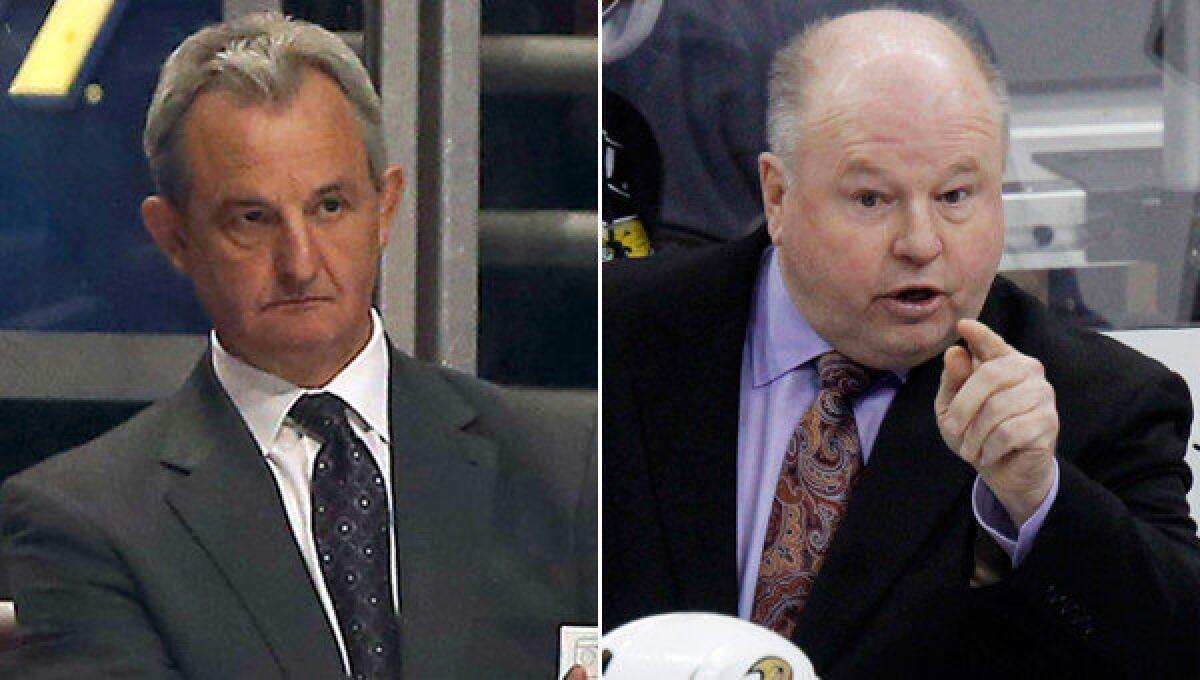NHL will have a regular season with an irregular schedule

- Share via
Darryl Sutter and Bruce Boudreau have so firmly established themselves on the local hockey scene that it’s easy to forget how briefly the two coaches have been here.
Sutter, known for his exacting manner and bitter-beer-face expression, succeeded Terry Murray on Dec. 20, 2011 and earned sainthood in the eyes of Kings fans for guiding the team to its first Stanley Cup championship six months later.
Boudreau, who became a cult figure for his animated and often profane behavior on HBO’s “24/7” series while coaching the Washington Capitals, succeeded the dour Randy Carlyle on Nov. 30, 2011. He used his motivational skills to revitalize the Ducks and push them to the No. 2 West playoff seeding last spring.
Because both were hired in mid-stream and last season had a quick training camp before a lockout-abbreviated schedule, neither has presided over a full camp here. Or a normal season.
“I don’t know if the NHL is ever going to have a normal year again,” Boudreau said, laughing.
Although each NHL team will play the standard 82 games, this will be another abnormal season.
The league will take a break from Feb. 9 through Feb. 25, allowing players to represent their homelands in the Sochi Winter Olympics, but producing a tight schedule and playoffs that end in late June. A reconfigured format ensures each team will play every other team at least twice, giving fans a look at out-of-conference superstars but making travel tougher for many teams.
The first step comes Wednesday, when players report to training camp for physicals. They will begin skating Thursday.
Sutter, whose team will practice in El Segundo, will recycle plans he didn’t get to use last year — with a twist.
“It’s what we want to work on and redefine and re-establish,” he said, “and it’s going to be a good camp when you look at numbers, because of the competition.”
What the Kings want to reinforce is simple.
“Just the type of team we are, the type of game we play. Last year we had to jump right in and we had the extra attention and activities the guys had to do on short notice when we came back,” he said, referring to demands made on the reigning Cup champions.
“This year there’s been more time just as a group ... instead of having to do things away from the rink that weren’t really hockey-related. I think that’s good for us.”
That bonding should help during a hectic schedule. The Kings open Oct. 3, two days after some teams begin, and play their final game before the Olympic break Feb. 6, two days before many other teams disperse. Sutter has been projecting how the Sochi tournament will go for his potential Olympians and how soon they can return to Los Angeles. Eight Kings could compete for the U.S., Canada, Russia and Slovenia.
“The way our games are, we’re playing just about the same ratio as last year,” he said. “It’s a tough schedule again.”
Boudreau faces similar concerns with 11 Ducks having been invited to Olympic orientation camps or listed on preliminary rosters of the U.S., Canada, Finland, Sweden, and Switzerland. He has focused on the possibility that playing highly charged games 11 time zones away could sap players’ energy for the season’s final six weeks.
“It really magnifies the importance of a good start when you look at your schedule and what’s going to happen,” he said, citing a stretch from mid-October through mid-November that includes two East Coast trips. “Getting off to a good start, the goal of being in better shape than other teams, is really important, I think.”
Boudreau, whose team will practice at Honda Center, had the grace to admit no one really needs a long training camp. But he’s eager to see prospects he has only heard about, and get teaching time.
“It’s exciting to have a full camp and it has very little to do with getting systems in because we got them to play the way we wanted in four days last year,” he said. “It’s the continuity of getting everybody together on the same page, the same hunger through everybody, getting to know everybody in the organization. ...
“Every year is new, where if you think you made mistakes last year, you can correct them. It’s like a golf game that you played nine holes and made a couple of mistakes and it starts over. That’s a little bit like training camp. Every year you think of something you could do better or you find new drills you want to implement or you think that you want to try a little tweak in the system you’ve had, and you have all this time — plus seven games — to get it done.”
And so it begins, normally abnormal.
Twitter: @helenenothelen
More to Read
Go beyond the scoreboard
Get the latest on L.A.'s teams in the daily Sports Report newsletter.
You may occasionally receive promotional content from the Los Angeles Times.







